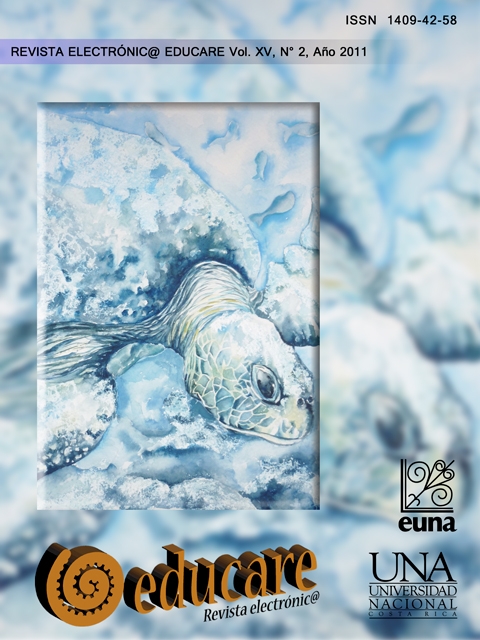Who is the Subject in Educational Research?
DOI:
https://doi.org/10.15359/ree.15-2.1Keywords:
Subject, identity, subject construction in educational research, subject-object relationship, intellectual autobiographyAbstract
In this paper I argue, first, that the identity of the researcher has an impact not only in the way she/he invThis article explains, in the first place, that the identity of the researcher not only influences his way to do research, but also the teaching processes and, therefore, training of future researchers. Secondly, it states that schools and teachers play a central role in the construction of identities. Third, this paper emphasizes that those engaged in educational research are not released from this responsibility, so this is an invitation to reflect on the following: What are our responsibilities in the process of identity construction? Who is the subject of education? Who is the subject of educational research? How inclusive is our notion of both the educational and the empirical subjects?
Through the analysis of questions on topics such us: the subject-object relationship; the subject in educational research; the contribution of subjectivity; the contribution of phenomenology; among others, this paper explains that: a) the intellectual autobiography is a great potential instrument to understand the direction of a research process and b) focusing on people, their history, social relationships and environment, as subjects and not just as objects of study, is an epistemological, political and ethical movement, which recognizes the subject’s action in and on the world. Finally, this paper states that qualitative researchers should not only understand who they are, they are ethically obliged to make it explicitly.
References
Berger, P. y Luckmann, T. (1987). La construcción social de la realidad. Buenos Aires, Argentina:
Amorrutu.
Chavarría-Rojo, A. (2006). El mito de la realidad. Recuperado de http://alexchrojo.blogspot.
com/2006/03/por-qu-el-mito-de-la-realidad-un-ao-y.html
Da Silva, T. T. (2001). Espacios de identidad. Nuevas visiones sobre el curriculum. España:
Octaedro.
Diker, G. y Terigi, F. (1997). La formación de maestros y profesores: hoja de ruta. Buenos Aires,
Argentina: Paidós.
Erdheim, M. (2003). La producción social de la inconsciencia. Una introducción al proceso
etnopsicoanalítico. México: Siglo Veintiuno Editores.
Fonseca, A. L. (2005). Del Cielo a la Tierra (Ensayo sobre antinomias, desencuentros y dualismos).
San José, Costa Rica: Editorial Costa Rica.
Gadamer, H.-G. (1976). El círculo hermenéutico y el problema de los prejuicios. Universidad de
Chile: Teoría.
Girardi, G. (1977). Por una pedagogía revolucionaria. Barcelona: Laia
Gurdián, A. (2010). El paradigma cualitativo en la investigación socio-educativa. San José, Costa
Rica: EUCR.
Magendzo, A. (2004). Alteridad, componente fundante de una educación ciudadana. Recuperado
de http://www.educarchile.cl/Portal.Base/Web/VerContenido.aspx?ID=77979
Miglianelli, A. (s. f.). De la ecología a la ecología social. Red de Ecología Social. Biblioteca de Ecología
Social. Recuperado de: http://www.ecologiasocial.com/biblioteca/MiglianelliEcologiaSocial.
htm
Schutz, A. (1974). Estudios sobre teoría social. Buenos Aires, Argentina: Amorrortu Editores.
Downloads
Published
How to Cite
Issue
Section
License
1. In case the submitted paper is accepted for publication, the author(s) FREELY, COSTLESS, EXCLUSIVELY AND FOR AN INDEFINITE TERM transfer copyrights and patrimonial rights to Universidad Nacional (UNA, Costa Rica). For more details check the Originality Statement and Copyright Transfer Agreement
2. REUTILIZATION RIGHTS: UNA authorizes authors to use, for any purpose (among them selfarchiving or autoarchiving) and to publish in the Internet in any electronic site, the paper´'s final version, both approved and published (post print), as long as it is done with a non commercial purpose, does not generate derivates without previous consentment and recognizes both publisher's name and authorship.
3. The submission and possible publication of the paper in the Educare Electronic Journal is ruled by the Journal’s editorial policies, the institutional rules of Universidad Nacional and the laws of the Republic of Costa Rica. Additionally, any possible difference of opinion or future dispute shall be settled in accordance with the mechanisms of Alternative Dispute Resolution and the Costa Rican Jurisdiction.
4. In all cases, it is understood that the opinions issued are those of the authors and do not necessarily reflect the position and opinion of Educare, CIDE or Universidad Nacional, Costa Rica. It is also understood that, in the exercise of academic freedom, the authors have carried out a rogorous scientific-academic process of research, reflection and argumentation thar lays within the thematic scope of interest of the Journal.
5. The papers published by Educare Electronic Journal use a Creative Commons License:















 The articles published by Educare Electronic Journal can be shared with a Creative Commons License:
The articles published by Educare Electronic Journal can be shared with a Creative Commons License: 



